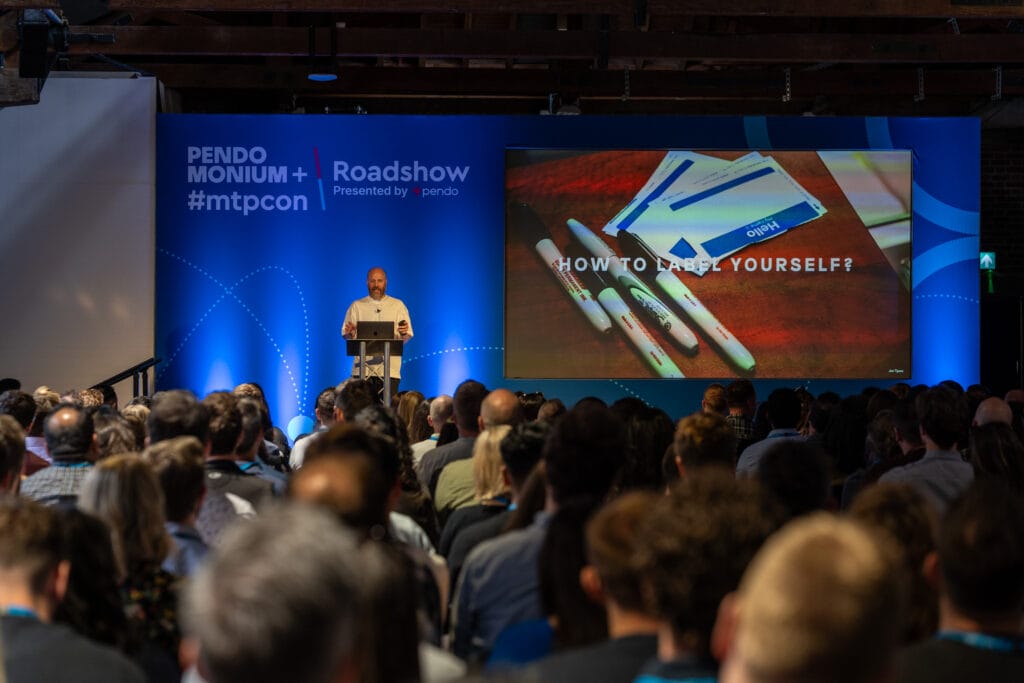6 things we learned at the Pendomonium + #mtpcon roadshow — London 2024
Our second stop at the Pendomonium+#mtpcon roadshow was at the vibrant Tobacco Dock in London, where we were fortunate to enjoy fantastic weather. The day was filled with a wealth of valuable insights delivered through roundtables, keynote sessions, and panel discussions. Here are six takeaways from our stop in London!
Hire the right people
The opening keynote of the day was led by Jonty Sharples, a Product and Strategy Consultant with years of experience in the UX and Product field. In his talk, Jonty walked us through the state of product management and explained the importance of being open to change.
Jonty urged us to foster an open environment for change and innovation.
AI will be the next inflection point in our working lives. It’s down to the product leaders to encourage others to listen to it and be open to change.
—Jonty Sharples
Due to the ever-changing field, he explained that communication and openness are key, and you can gain this through creating or joining a community. This collective problem-solving and openness will only move us forward.
Jonty explained that hiring teams should ensure the people they hire clearly understand their roles. They need a career path to show that they have a future ahead of them.
Do the detective work. Really think about the people you’re hiring and the skills you’re gaining from doing so.
—Jonty Sharples

Align on objectives. Rely on collaboration
The panel discussion featuring Ben Hollinsworth, Head of Product Design at Alto (Part of Houseful), Frances Ibe, SVP of Product at Tide, and Claire Bauden, SVP Global Product Design at Global Payments Inc. moderated by Mark Chillingworth, shared their views on organising product teams and aligning objectives.
Claire noted the multiple roles product managers must juggle, stressing the need for product operations to relieve some of these burdens. Ben discussed the importance of focus and its impact on company performance and pressure on product managers.
Organisational design enables product managers to own more of the experiences, Frances pointed out.
Frances added that there are a lot of problems with the way organisations are designed.
We need to pause and ask how we are designing organisations to enable products managers to own more of the experience.
—Frances Ibe
The key message that resonated with us all was collaboration is the key to driving innovation.
Communication and strategy are key
Lindsey Jayne, CPO at the Financial Times, led the second keynote of the day. In her inspiring session, she walked us through the FT’s journey to introduce AI into its business model.
From this journey, she shared some clear learnings with the audience: building the right products is one thing, but evolving into an organisation that can build great AI products is the biggest challenge. “Disruption is an opportunity to lay a path. It’s an amazing opportunity to do new things,” she said.
Linsdey explained that a big part of our jobs as product people is to ship the product, but another big part is to communicate it.
Create a strategy, ship the product, and communicate. It has to be all three.
—Lindsey Jayne

Build relationships and bring everyone on the journey
Following this keynote was a panel discussion on AI involving Francesca Buckland, VP of Product Management at Clarivate Analytics, Tariq Maonah, SVP Product, Generative AI at Citi, and Etienne Martin, VP of Products at Algolia, moderated by Tom Allen, Editor and Founder of the AI Journal. The takeaways focused on their experiences with AI and the best practice fundamentals that they focused on while doing so. “It’s really important to know what your users want,” Fran said.
Tariq added, “As models improve, it’s how you bring those into the organisations as quickly as possible. Getting the buy-in from the top really helps.”
As product managers, it’s important to have a great relationship with your data scientist team. “Prioritise the opportunity that you have and make full use of the capabilities on offer,” Fran said.
The panel concluded by explaining the importance of taking everyone on the AI journey. Set that expectation upfront. As things develop, that collaboration is key. “Be very honest about what we know and don’t know with AI. Managing expectations is important,” Etienne said. This transparency and communication will help build great products.
The role of product is expanding
Kicking off the first of the afternoon talks was Nichole Mace, SVP Product, User Experience at Pendo. Her message was clear.
It’s a time for expansion. We need to respond to what’s happening out there in the world.
—Nichole Mace
Nichole explained that being a product manager has changed and will continue to change. We are in the midst of a seismic shift. “Gone are the days of ignoring feedback. It’s important to stay close to your customers, share your roadmap, and collaborate with them,” she said.
Being relevant is hard, but fun
In the closing talk of the day, Yuelin Li, CPO at Onfido, delved into her unconventional journey into a product leadership role and the evolving landscape of product.
Yuelin explained that the role of the CPO is rapidly evolving, with more CPOs present in Fortune 1000 companies. Additionally, 70% of CPOs manage a P&L, and many are at the forefront of driving the AI agenda within their organisations.
It’s hard for product people to balance external and internal expectations. However, Yuelin explained that it’s never been more critical to combine customers, business, and technology. Being relevant is amazing.

Unconventional career paths are becoming more valuable in today’s ever-evolving landscape. Yuelin’s message was clear to us: Embracing continuous learning, diverse perspectives, and change can lead to richer, more fulfilling career trajectories.
Our stop in London was jam-packed with so many insights. This recap is just a nugget of the great takeaways shared throughout the day, so be sure to stay tuned for full write-ups of all the keynote and panel sessions in the coming weeks! Next stop: Berlin!


